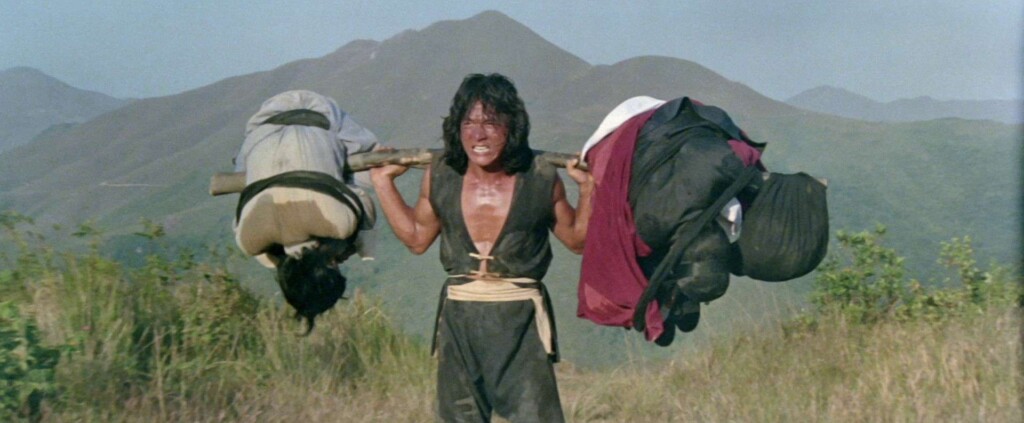With the seventh installment of the Mission: Impossible franchise still screening in theaters, I’ve seen many film and culture critics—and the occasional box office pundit—lament the fall of the movie star and citing Tom Cruise as the final great of the type. Ignoring the way this English-centric analysis erases global and other national stars such as Shah Rukh Khan and Wu Jing, there is a grain of truth behind the hyperbole: the movie star is dying. The action star may already be dead.
But the greatest entertainer in the era of mass media is still alive. Jackie Chan is no longer in his prime—that would be a lie so bold not even Trump would dare say so (not that he cares about a Chinese filmmaker anyways)—but he is still alive, seemingly healthy, and making movies. And it’s okay if he isn’t making Police Story films anymore because his legendary filmography atones for any future artistic sins. If you haven’t seen Jackie Chan in his prime, roughly 1980 to 1993 (pre-Rush Hour, to be certain)—then you have a craterous cultural blind spot in need of remedying. If you find yourself unable to enjoy a prime-era Jackie Chan action flick, I’m convinced you just don’t like movies as an artform.
His first film with the Golden Harvest production company and his second film as director, 1980’s The Young Master, is the beginning of his peak (though some may argue Drunken Master as an even earlier departure into greatness). It’s also the film where his sensibilities come into full form, his hallmarks trademarked. His stunt work approaches new levels of complex choreography and his non-action acting has leveled out following more outlandish earlier iterations like his 1979 directorial debut The Fearless Hyena. While Hyena’s highpoints are classic Jackie—notably, the chopstick fight—its lows, including the “emotional kung fu” climax, are symptomatic of an immature performer. By the time he directed again with The Young Master, he traded a purse of immaturity for a note of sincerity. The sum changed film history.
In The Young Master, Jackie gets the shit kicked out of him, blends humor and action antics seamlessly, and, like Cruise, performs to the fullest in the face of danger and cinematic violence. It’s the ultra-human formula at the center of all his greatest films: extremely staged but extremely human authenticity. The authenticity seeps from Jackie’s personality. In the film, the young Dragon Lung (Chan) seeks to restore his disgraced brother Tiger (Wei Pai), now manipulated by a troupe of dangerous criminals, to their martial arts school. The master at the school would certainly be considered abusive by today’s standards…and possibly even by 1980’s.
As anyone familiar with Jackie’s own life story knows, and as told in his autobiography Never Grow Up, he grew up (and lived) from a very young age at a Peking Opera School called the China Drama Academy. As he recalls in the book, he was physically beaten there—and he has some discomfort in recalling these memories—but he never lingers on them or condemns anyone. He recalls the memories with what I can only call a sense of tough love. As a director, Jackie appears eager to tell a similar story. Dragon holds himself to standards of loyalty and respect for authority that sees through the abuse for some sort of emotional greater purpose. Sure, the master doesn’t treat him the way he wants to be treated—but he’s master and knows better, right? This naked candor is also a trademark of the great action star…and I’d argue it’s what sets The Young Master apart from several of his earlier works.
Even Jackie’s unique proclivities transpire in very articulate ways here. In the film’s final big fight, Dragon saves a giant pot from smashing to pieces. When asked why, he answers, “I don’t like seeing nice things getting broken.” It’s an insignificant line that carries a mass of foresight. Across his filmography, from Rush Hour to Police Story, he is perpetually saving precious Chinese artifacts from being thieved or destroyed. His characters famously turn any items into weapons, usually for humor, though they never do so without trying to spare such trivial things from carnage, especially things owned by others. Flower pots and picture frames are collateral for antagonists. A hero would save the flowers—and Jackie knows that.
Of course, there’s also the action—his one of a kind goofy and precise kineticism. Hollywood never matched the beauty and balletic grace of the fan fight in this 1980 film; it’s probably the third best fight in the film, a rather insignificant little moment in the career of the silver screen’s greatest performer. It’s quite telling how easily this would rank among the greatest single fights in the history of American filmmaking, even if its beauty would look a bit alien on that pedestal of violence. He just had that special something that is a rare commodity today: star charisma.
Jackie Chan, at his peak, was our greatest entertainer.

Joshua Polanski (’20) is a freelance film and culture writer who writes regularly for the Boston Hassle and has contributed to the Bay Area Reporter, In Review Online, and Off Screen amongst other places. His interests include the technical elements of filmmaking and exhibition, slow and digital cinemas, cinematic sexuality, as well as Eastern and Northern European, East Asian, and Middle Eastern film.


